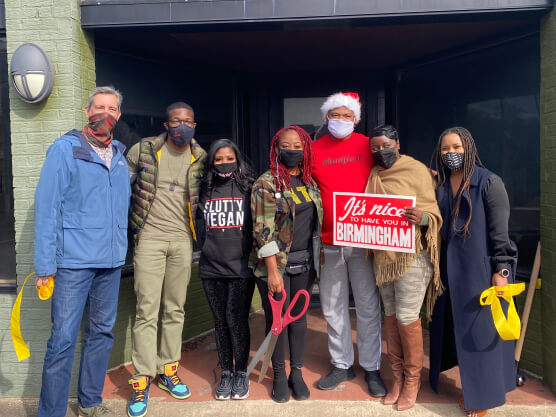A Week of Growth, Joy, and Purpose
This week reminded me exactly why I love what I do. Our Programs Team at Woodlawn United hosted Rise and Thrive Camp: Thrive Week—a week of engaging, structured activities designed for children who were out of school for intersession, or as many call it, “fall break.”
From 11 a.m. to 3 p.m. each day, the Kingston Community Recreation Center became a place where children could learn, create, and connect in a safe and joyful environment.
Takeoff Tuesday: A Day to Remember
Tuesday was Takeoff Tuesday, and it truly lived up to its name. We “took off” from the gym and headed to the Birmingham Civil Rights Institute with 50 children and nearly 25 parents plus our amazing program coordinators, HABD staff, interns, and UAB student volunteers!
For many, it was their very first visit to the Institute. Watching their faces light up as they connected history to their present lives was nothing short of powerful. These moments—of discovery, reflection, and inspiration—are what make community programming so worthwhile.
Creating Safe Spaces That Heal
This week, I witnessed more than fun and field trips, I saw transformation. The Rec Center became a safe haven.
Children found protection there from the ills of the street, the instability of home, and the pressures that often come with growing up in challenging environments. Inside those walls, they found mentorship, compassion, structure, and a sense of belonging.
That’s the beauty of programs like these: they don’t just fill time—they fill hearts. They nurture confidence, build resilience, and connect community across generations.
The Work Ahead
This experience also solidified something I’ve long known: our communities need more.
We need:
• After-school programs that extend safety, structure, and learning beyond the school day. • Volunteer literacy coaches to help children strengthen their reading and comprehension. • Funding to support field trips, enrichment experiences, and exposure opportunities—museums, fine dining, CEO conversations, and career exploration visits.These experiences protect and empower our youth. They inspire them to dream bigger and aim higher.
Why I Love This Work
I love my job because it allows me to witness growth, unity, and joy every single day. I see parents and children laughing together, elders guiding youth, and neighbors turning into a community family.
Programs like these build bridges—between people, between generations, and between hope and opportunity.
That’s why programs matter. That’s why I’ll always advocate for them.
About the Author
LaShunta “Shun” Boler
Chief Programs Officer, Woodlawn United
Shun is a visionary leader and community advocate with over 20 years of experience in social wellness, urban education, and community development. As the Chief Programs Officer at Woodlawn United, she leads initiatives that strengthen families, empower youth, and foster intergenerational connections across the Woodlawn–Kingston footprint.
Shun is deeply passionate about creating programs that offer safe spaces, build resilience, and expose children and families to opportunities beyond their everyday experiences. Known for her trauma-informed approach and compassionate leadership, she believes that when communities are given access, they find the power to transform themselves.

